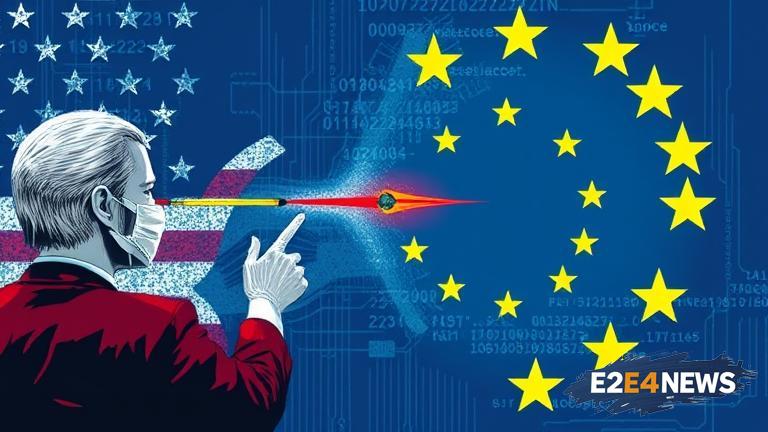The Trump administration has unveiled a comprehensive plan to promote the development and deployment of artificial intelligence (AI) in the United States. The plan, which aims to reduce regulatory barriers and promote innovation, has been widely praised by industry leaders and experts. However, some have warned that the plan must also confront the growing threat of Europe’s data protectionism. The European Union’s General Data Protection Regulation (GDPR) has been criticized for its overly broad and restrictive approach to data protection, which some argue is stifling innovation and hindering the development of AI. The Trump administration’s plan recognizes the importance of data in driving AI innovation, but it must also address the challenges posed by the EU’s data grab. The EU’s approach to data protection has been characterized as a form of protectionism, which seeks to restrict the flow of data across borders and limit the ability of companies to collect and use data. This approach has been criticized for its potential to stifle innovation and hinder the development of AI. The Trump administration’s plan seeks to promote a more balanced approach to data protection, one that recognizes the importance of protecting individual privacy while also promoting innovation and economic growth. To achieve this, the plan proposes a number of measures, including the development of new regulations and standards for the collection and use of data. The plan also recognizes the importance of international cooperation on data protection, and proposes a number of measures to promote greater cooperation and coordination between countries. Despite these efforts, some have warned that the plan may not be enough to address the challenges posed by the EU’s data grab. The EU’s approach to data protection has been characterized as a form of regulatory imperialism, which seeks to impose its own standards and regulations on other countries. This approach has been criticized for its potential to stifle innovation and hinder the development of AI, and some have warned that it may ultimately harm the global economy. The Trump administration’s plan must therefore be seen as part of a broader effort to promote a more balanced and innovative approach to data protection, one that recognizes the importance of protecting individual privacy while also promoting economic growth and innovation. The plan’s emphasis on reducing regulatory barriers and promoting innovation is a step in the right direction, but it must also be accompanied by a more robust effort to address the challenges posed by the EU’s data grab. This will require a coordinated effort from governments, industry leaders, and experts, and will likely involve a number of complex and challenging negotiations. Ultimately, the success of the Trump administration’s AI plan will depend on its ability to balance the need to protect individual privacy with the need to promote innovation and economic growth. By taking a more nuanced and balanced approach to data protection, the plan can help to promote the development and deployment of AI, while also protecting the rights and interests of individuals. The plan’s recognition of the importance of international cooperation on data protection is also a positive step, and reflects the growing recognition that data protection is a global issue that requires a global response. As the plan is implemented, it will be important to monitor its progress and assess its impact on the development and deployment of AI. This will require ongoing evaluation and assessment, as well as a willingness to make adjustments and changes as needed. The Trump administration’s AI plan is an important step forward, but it is only the beginning of a longer and more complex process. By working together and taking a more balanced and innovative approach to data protection, we can help to promote the development and deployment of AI, while also protecting the rights and interests of individuals.





